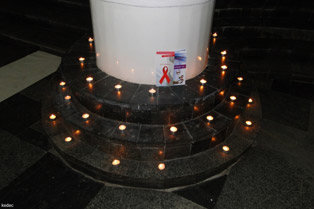Eka Kevanishvili, radio Liberty
Georgian Center for Psychological and Medical Rehabilitation of Torture Victims (GCRT) conducted stage-to-stage inquiry regarding the issues of human rights and torture in 2003, 2007 and 2011 years among Tbilisi population.
Researchers studied the attitude of public regarding the socio-economic problems in the state, the level of human rights protection, aggression and violence level and understanding the significance of prevention of torture.
Three researches conducted on the same issue in 2003, 2007 and 2011 gives organizations and experts in the sphere of human rights a chance to see the attitudes of society in dynamics and analyze the changes. For example, if in 2003 and 2007 for about 12% of the inquired people torture was associated with the institutions like police and prison, the situation changed in 2011 and only 0.9% had association with the police when hearing a word torture and 4.3% - with the prison.
It is interesting to check one of the paragraphs of the inquiry – torture associations where several groups were emphasized: If in 2003 for the fifth of the respondents the word “torture” implied heavy socio-economic situation in Georgia, for 2011 these kinds of associations are less than 5%. One more association while hearing the word “torture” was the case of Sandro Girgvliani among the respondents inquired in 2007 and 2011. The authors of the research also note that for 0.5% of the respondents the word “torture” raises associations with the government.
However, it should also be said that unlike the researches conducted in 2003 and 2007, recalling the cases of both physical and moral humiliation has been decreased lately. Lela Tsiskarishvili, director of GCRT notes with radio Liberty that contradictory results can be explained by the influence of public and informative campaigns: particularly, according to her, media which is the most important factor for forming the public opinion for the last two years covers the facts of violence rather harshly, especially in the private relations. On the other hand, the reportages which cover the facts of insults and humiliation from the state bodies are rather few:
“It seems like the lack of information in the public creates a background when the society thinks that everything is ok. It seems like the human rights have disappeared from the public realm and the number of people who think that the reaction is needed to the human rights violations has decreased,” – notes Lela Tsiskarishvili.
According to the data of three researches, most often the main factor of humiliation is hard socio-economic situation. Ucha Nanuashvili, the head of Human Rights Center thinks that the results of the research are not critical enough and the respondents do not talk about the significant issues like the problems of IDPs. However, they emphasize on the problems of unemployment and criminal issues.
“This is the result of propaganda and the media situation established in Georgia in the recent period,” – states Ucha Nanuashvili. He talks about the fear factor caused by the punitive acts of government: “This is a result of propaganda that works rather seriously and leaves its trace. The public remembers the information broadcast by national channels and recalls and focuses exactly on those social-economic problems that are covered. They recall these issues in the first place and not those basic problems avoided by Georgian media. On the light of situation for the past years – special operations, arrests which take place every day in different forms affects the society. This research shows that the nihilistic attitude has been established in the public,” – states Ucha Nanuashvili.
Lia Mukhashavria, the head of Human Rights Priority states that since the society is not provided with the unbiased information, they receive a more disfigured picture than compared to previous years. According to her, it depends on the media how adequate the ordinary citizens are going to be towards the surrounding developments.
“Media is the best intermediary to spread the right information to form the adequate understanding about violence and torture in the public. Only based on information and knowledge can the public make qualifications regarding certain acts and the real victims can realize their status,” – states Lia Mukhashavria radio Liberty.




